|
Lion's Tooth co-founder Cris Siqueira in conversation with cartoonist Gilbert Hernandez, his wife Carol Kovinick Hernandez and their daughter Natalia Hernandez Cris Siqueira met Gilbert Hernandez at the 1997 San Diego Comic Con and then visited his home in Los Angeles. Twenty years later, she sat down for a group interview with Gilbert, his wife Carol Kovinick Hernandez and their daughter Natalia Hernandez (also a cartoonist) in Las Vegas, where they live now. In 2017, one day before getting married in Vegas (by the real Elvis, in case you’re wondering), my then-future-husband Brock and I met legendary cartoonist Gilbert Hernandez, his wife Carol Kovinick Hernandez, and their daughter Natalia Hernandez (also a cartoonist) for coffee, a light meal and a group interview. I had not seen or spoken to Gilbert in 20 years. Gilbert Hernandez and his brothers Jaime and Mario started writing and drawing their magazine Love And Rockets in the early 1980s. It is a legendary publication and still my absolute favorite comic book. Gilbert and Jaime Hernandez were the first cartoonists I interviewed in my journalistic career in Brazil. We talked on the phone in 1996 as they announced that issue number 50 of Love And Rockets would be the last one—and it was, until 2016, when the brothers went back to the original format, currently in number 7. They never stopped making comics, though. To understand the various incarnations of their work check out Fantagraphics’ guide on How to Read Love and Rockets. In 1997 I quit my dream job at MTV Brazil to travel around the United States for two months interviewing my favorite cartoonists. Meeting the Hernandez brothers in person was at the very top of my list. I talked to them at the San Diego Comic Con and then visited their homes in Los Angeles. This interview is part of a series of articles in which I revisit the folks I met on that trip. It has been edited for clarity. Let's start at the beginning. (To Gilbert and Carol) How did you two meet? Gilbert Hernandez: We met the first time that The Clash played in Los Angeles. Carol Kovinick Hernandez: Yes, the first tour. [laughs] When we first knew each other, I didn't know that he wrote comics or he could draw or anything. Gilbert: It was a secret. Carol: He later said that he and Jaime could draw and were writing comics. So that was interesting. I got to see the whole thing as it happened, you know? (To Natalia) Are you a comic book artist too? Natalia Hernandez: I've been trying to do some comics. I did a backup story for DC and that was really exciting. I like doing it, but I don't know if I'm any good. [laughs] I have fun. Are you also going into filmmaking? Natalia: Oh, yes. I love film. I love cinema. I just like telling stories. So, I'm just going to try all sorts of mediums and see what works out. Did you read comics as a kid? Natalia: Yes. My dad introduced me to the comics he read. He'd be like, "Oh, I'm going to show you this today." And he'd read it to me before bed or show me all sorts of stuff. He'd show me the Venus stories [Gilbert's comics for kids] but he wouldn't really show me a lot of his work. [laughs] I read somewhere that you weren't allowed to read Gilbert's comics as a kid because of the adult content. Natalia: He's a dad, so he wants me to read his comics when I'm 80. [laughs] My friends, they think it's cool. I'm kind of in this fun liberal bubble and it's nice. [laughs] When I was little I was mad. I couldn't believe it, like, "I can't read this? What do you mean?" Now I get it, it makes sense. Before, I was all offended. Gilbert: The problem is that I could not show her things, and her friends would go "Look." Natalia: Like, "Look what your dad does." I'm like, "Yep." Gilbert: It's interesting because Jaime and I have done kids in our comics, and stories about them, and their feelings and this and that. People assume it's for kids, but it has never been for kids. People say "Oh, I read your comics to my kids all the time. --How old is your kid? --Seven." I go, "That's not for a seven year old." I don't stop them, but I have to say these stories are for adults, and I don't mean in an X-rated way, just for an adult reader, the mindset of an adult. Was Natalia around when you drew the Venus stories? Gilbert: No, that was before. Some of the Venus stories were for adult readers, but I drew ones that were actually for kids. And when we collected them, the book was too short, so I added a new story and Natalia was young when I did that. Did you get inspiration from having a little girl in the house? Gilbert: Probably. I wanted to make a comic that she could read, that she could look at. That’s what that was for, really. Natalia: I enjoyed it. I thought it was great. I was always like, "I wonder what my dad does." I knew he made comics but I never really saw them. This was like, "Oh, man, I can show it to my friends." Exciting. [laughter] Carol: What’s funny is he used to draw little kids that looked like her before she was born, and then after she was born every once in a while I'd go, "This looks like Natalia". Some of the kids in the backgrounds and stuff. And then later I'd see things in Venus and "Oh my gosh, she is doing the exact same thing". Gilbert: It might have been like my cousins and Lucinda, my sister, who had these mannerisms when she was little. Natalia is a lot like my sister Lucinda when she was young, and some of my cousins, so it could have come from that. Most of the strong characters in Love and Rockets are female. You rarely show the perspective of a male character. I mean, really, Khamo doesn't say anything. [laughter] Carol: His mom and his aunts and his grandmothers raised him, so maybe that's what it is. Gilbert: Yes, that's a big part of it, I think. Because when you grow up the men are doing what they do, but the women are more involved in the family. (To Carol): I remember seeing you as a character in Love and Rockets. You win the beauty pageant. Gilbert: Yes. I thought it would be a nice thing, a nice gesture. I had to have the main character Maria loose. They had to have a winner and "Who am I going to put for the winner?" Carol: It was a really nice surprise, yes. [laughs] You worked at Fantagraphics for a while, right? Carol: A little bit, yes, when they moved to California, shortly afterwards. Gary Groth asked me if I wanted to and I thought, "Well yes, sure." Do you draw? Carol: Yes, I actually made a mistake, in college, Jaime and I took an art class together. It was horrible because I look at what he's doing and what I'm doing and I'm like, "Oh my God, what am I even bothering for?" (To Gilbert): Can you talk about Garden of Flesh? Gilbert: I just wanted to take a break from what I was doing and make a funny adaptation of the Bible or Adam and Eve. Robert Crumb made one a few years before but everybody complained at how sad and dismal it was. It became a thing, kind of a joke. For some reason, any good depictions, at least in comics and most movies, it’s never a pleasant thing anymore. I remember growing up thinking there was a lot of joy to faith. There was a lot of joy to people believing. It wasn’t all "evil priest". There was that, but that wasn't the core of it. It was decent people following a decent path, and I knew that that existed. So I decided to go to the root and use Adam and Eve as happy. [laughter] They make their mistake, of course, and then everything happens, but they were essentially decent people. People go, "You made them like airheads." They were cavemen. They knew nothing except enjoying the garden. Garden of Flesh is so explicit, but you've been blanking out the boobs in Love and Rockets with a "must be 18" tag. What's that all about? Gilbert: I'm doing it for a laugh. It's just a joke because I still want Love and Rockets to have a broader audience than other comics. There are still people interested in it and the stories I'm personally doing right now interfere with that. So I'm doing the joke of putting that. I must be a dick because I'm actually taking that away. Well, some of your work is very difficult to read in public, I'll tell you that. Gilbert: Yes, I'm actually moving a lot of that stuff out of Love and Rockets. It has nothing to do with censorship or trying to please pressure groups. I just decided it would be better that way. I have a Luba tattoo, but it's Luba as a kid. I didn't want to tattoo her giant boobs. [laughter] Gilbert: Oh, you just have a fake. It seems that Luba-sized boobs have become more common. Gilbert: Yes. It was weird in the early days of the comic, and then, after a while, everybody was like, "She just looks like a lady you see at the mall". I've also noticed you're using a device for flashbacks, surrounding the panels with thicker lines. Gilbert: I'm doing that specifically with the new Love and Rockets because it gives the reader a chance to understand what's going on right away. I've been very vague in the past. For a long time, I've had dream-like techniques, where you wouldn't know if it was the past or if it was a dream. You weren't sure about it, but I realized that people lost interest. So I listened to the readers. Just to clarify everything. I have the little captions that say, "Pipo's house", "the beach house", "Fritz's and Pipo's beach house". I say where they are now because I would often throw the characters into a new scene without telling you where they were. I didn't realize how much that was confusing readers. Thinking back to our conversations in the late 90s. At that point there were very few Latinx alternative cartoonists, and now there are many Latinx comics conventions and artists working in all genres. Gilbert: The 80s created the indie comic scene, so there's a freedom now for young people to go and not have to worry about dealing with the big companies or whatever if they have artistic aspirations to comics. That's great. There are many young people making indie comics. They're usually personal, the better ones. They don't even know Love and Rockets because it's been that many years. They hadn't been born yet. Now if you like comics and want to draw them, there's a place where you can get a good start. Even Natalia, if she did comics in the past, there wasn't always a place for her to put her comics out. We could've gone to a convention and sold them, but it would've been a little thing. Now people want to see her comics. She draws just as well as a lot of the indie beginners in comics, and these are older people. It's good that way, it's really open. Also, Jaime and I are old veterans now. People take us a little more seriously, and that's nice. Did you just turn 60 [in 2017]? Gilbert: Yes. It's a weird number, because when I was a kid growing up, 60 meant old. You're an old man and that's how it's going to be now. I suppose it's true, but I don't feel it. How old is Luba now? Gilbert: I'm drawing her around 60ish, but she should be closer to 70. I slowed things down because I don't want them to be too old too fast. She's only in her early 60's, mid-60's maybe. In our first interviews you said you felt like celebrities in conventions and among your cartoonist friends, but then you went back home, and you were all alone. Is that still true? Gilbert: Yes. I've heard writers say that too. You can go out in the world, you can go to a convention or to a university to speak, which we've done often. A convention where everybody really likes your work and they're all happy to see you. You go to a comic store and if they know who you are, they're always really nice and this and that, which is great. Then you go home and when it's time to work, you have to be by yourself. It has to be quiet. Back in the 80s, when we first went to England, or the one time we went to England, we had just gotten back from a convention in Dallas, Texas where we were guests. In the audience was Carol and another woman, who was there just to date Gary [Groth] and that was it, that was the audience. Carol: That was at a panel. Nobody came. Gilbert: We were used to that, "Oh, well, nobody came...", so no big deal. We go to London, it was an auditorium filled with people. Carol: When they came out on stage, Jaime's wife at the time and I were thinking, "Okay, we'll clap because we didn't know if anybody is going to know who they are." And they came out and everybody cheered them and we were shocked. They all knew them, it was a packed auditorium and that was like, wow. [laughs] Gilbert: Yes, it was a big deal. (To Gilbert): You and Jaime are both influenced by Archie Comics - what other influences do you see in your work? Gilbert: Gosh, there's so many, because I work almost on an unconscious level. I think the Archie comics one is probably-- it's almost like we decided to do Archie comics for adults, but for real, not a parody or anything like that. Take basically what we liked about Archie comics and then bring it into our own thing. Because a few of the artists that worked in Archie comics were actually very good. They were working in that style, but they were actually very good artists and they communicated a lot better than many of the Marvel and DC guys, who I liked for their own different reasons. You throw a stack of comics in front of a bunch of kids and they'll gravitate to the Archie comics. When I was a kid in Brazil I had an American Betty and Veronica comic book, but I didn't know how to read English, so I made up what the characters were saying. And when I actually learned English it was like, "Oh, the stories are dumb." Then as I teenager I read Love and Rockets and I was like, "This is what I thought Archie comics were like, this is what I wanted them to be." Gilbert: That's funny because the cartoonist Lynda Barry said the same thing. She said she loved Archie comics as a kid and then when she went back to them, she goes, "Oh, these are for small children. But there's comics here. Oh yeah, you can use this, but to make real comics." What brought you and your family to Vegas? Gilbert: We were living in Los Angeles and our landlords were going to sell the house. It just basically got unaffordable in LA. It's terrible. I don't know how people live there, who are not in show business. It just got to be too much because we needed a house for Natalia. The house I visited in 97 was great. Gilbert: Yes, it was a nice little house. Carol: It was small. Gilbert: But the good landlords sold it to the evil landlord. That's what happened, basically. Carol: Yes. [laughs] Gilbert: We were just "let's go find a house". She needs the yard, and it was just impossible. At the very same time, Carol found out about how there was a big boom in construction in Las Vegas. Carol: We looked, and we were like, "Wow we can actually have a real house here." Gilbert: A real nice house. Carol: Yes, and we're still close enough to visit family. It's like a five-hour drive. (To Natalia): How was it, growing up in Vegas? Natalia: It's normal for me. I mean, I like it. When I was little, I was like "Oh, I'm a Vegas kid," but now it's cool. Did you think it was bad to be a Vegas kid? Natalia: Well, no. I just wanted to be Californian, because everyone in my family is Californian. I felt left out. [laughs] The beach is a thing, and here all we've got is a weird lake. I don't know how I did it, but I would play outside everyday. In shorts and flip flops, without water, in million-degree heat, but it was normal in the desert. That's my Vegas experience. The strip is there, but for me it's just the restaurants. I guess I'll never have that tourist feeling of, "Oh, wow, Vegas," because it's just home. Carol: It's too crazy. You kind of have to know where to go. (To Gilbert) Do you research the things you draw in your graphics novels? Gilbert: Yes, it used to be real difficult to do research, so I avoided it because it was difficult to find a type of car, a type of gun... So I thought, "Why am I researching guns?" I just took a generic shape and made the same gun every time. In the graphic novel Maus, the Art Spiegelman book, there's a scene where he's just finished talking to his dad, and he's walking home. He goes, "Now, I got to find a picture of an old press." An old drill press. Because it had to be 1932 and he had to get the right one. That was before Google, you know? Natalia: He has a box of Hot Wheel cars, just different cars, and I used to play with them all the time. I think he still stores them. Gilbert: I would draw cars using my toy cars, yes. Carol: They were the reference material. [laughs] Gilbert: But the problem is that they get dated quickly. All the cars are from 1979. [laughs] A question for everybody. Every time I read Love and Rockets I end up crying my eyes out. Do you cry when you read it, or do you cry while you write it, Gilbert? Gilbert: Nah. Natalia: Well, I haven't really read the stuff. I know I got to get around to it. Gilbert: She is allowed now. [laughs] Natalia: All my life I've heard people say, "Oh, this gets me real emotional." Okay, I guess I could feel that way. I'll get there. Carol: I've cried, but usually I will talk to him, "Wait, what is this? When did this happen?" and since it's him, I don't know if I can totally-- I mean, those characters are him. So it's a little different. How clearly do you see Gilbert in his characters? Carol: Actually, Luba is the most him. Gilbert: She's the most like me. [laughs] Carol: So it's weird for me. I can't completely separate it. Gilbert: I'll tell you when we cry. It's when we get the paycheck. [laughs] Carol: I was really sad, though, right at the beginning of Heartbreak Soup. When the kids grew up. I wanted to see more of their lives when they were still young. He had them grow up too quick for me. I mean, that was my thing because I love them. (To Gilbert) Who are your favorite new cartoonists working today? Gilbert: Well, this is going to be a useless answer but I haven't been really paying attention to new cartoonists right now. I just haven't. I've been working so much on my own comics. I do three comics at once, at the same time. I really just dropped by the wayside of who is new. People have to tell me, you have to tell me. How about Simon Hanselmann? Gilbert: I'm glad you brought him up. Yes, he's really good. There was actually a couple of things he drew that were so outrageously funny they kind of inspired me to do Blubbler [Gilbert's ongoing adult series]. It was just a little rude drawing, I don't even remember what it was, just that it was really funny to me. I go, "This should just be a whole comic book." Carol: I haven't been reading comics for a long time. I mean, anything new. We have a lot of old stuff in the house, he has collections. What are your all-time favorites? Carol: I still love Mad Magazine, the old ones. That was the first time I saw who drew what and so I knew who I liked better and that sort of thing. I have some of those little book collections and those are fun to go back to. (To Natalia) What about you? Natalia: I'm trying to think of new stuff, but lately I've been really into Jim Woodring's things. I just love his stuff. The weirder, the better, and it's surreal. And I got really into Junji Ito, which is horror manga. I'm way into that right now. But I'm trying to think of something new because that's kind of older. I don't know. Lesley Stein, I love her stuff. I have a couple of her books. Fantagraphics will send a package to my dad, I'll flip through it and grab stuff, that's usually what I get. Carol: When he first showed me comics, I loved Drew Friedman's stuff. I remember talking to alternative cartoonists in 1997 and everyone said "We're superheroes in our own minds, but the world hasn't come around to our way of thinking." Now it seems like many of you got the recognition you deserved. Do you feel vindicated, 20 years later? Gilbert: I don't think of it that way. I mean, I'm happy that people say, "Hey, it's great you've been doing this for this many years and dah dah dah." That's all good. But it's a work in progress. I still feel like I'm in the middle, trying to get to my better work, whatever that is. See, because I don't even know what that is. That's the way you look at it and I'm happy, but I'm aware of the technical aspects. Being around for 35 years and still doing comics that people want to see, that right there tells me that's good. It seems that the biggest conflict was being able to make a living out of comics, which many people have not been able to do. Gilbert: Many cartoonists stop because they can't keep drawing and work at the same time, or find work at the same time. That's what's distressing, really, that's the thing. You get a lot of praise like, "I love this comic," but it's hard to make ends meet. That's where a lot of the frustration comes in. There's the ego thing, like, "They should like my comic more." But that's not an issue, the issue is trying to continue because of the economics. Have you been able to do it? Gilbert: I've been able to do it by having different jobs, though. Doing different comics for different companies. I'm able to do that, but some cartoonist aren't. They can only do the one thing they do, and it doesn't sell. I'm able to move around and do different comics. Palomar has always been south of the U.S. border, but not specifically Mexico, right? Did it become more like Mexico when the characters came to America? Gilbert: I actually changed that. It no longer says, "Below the U.S. border." Now it says, "Outside the U.S. border" because there are other countries around, islands, so I wanted to include everybody, all the different Latino countries. I can do a story that's about Mexicans, but in a different context. But Palomar is going to remain in everybody's mind that we're all from there. Here's a sideline. If it ever becomes a TV show or a movie, none of the cultures can complain, "How come you don't have more Mexican actors? How come you don't have more Colombian actors?" Because that's a problem in Hollywood. So I've created a fantasy world where I didn't want that to happen. Just Latinx. Gilbert: Yes, and so, luckily, it's going to work out if there's a film or a television show, I'll still go with that. Your name is Gilberto, right? How did it become Gilbert? Gilbert: I went to school. It's first grade. The teacher goes, "Do you want to be 'geel-ber-toh' or Gilbert?" I'm, "What the hell do you think?" [laughs] Carol: What's a 'geel-ber-toh'? [laughs] Gilbert: I was, like, "Geel-ber-toh? That sounds awful." She goes, "Gilbert then." I go, "That sounds worse." Bit I thought, 'geel-ber-toh' is going to sound weird, so I said, "Gilbert." And that was it. From then on, it was Gilbert. (To Natalia): Do you speak Spanish? Natalia: Two words. It's terrible. I don't know Spanish. (To Carol): What about you, did you grow up speaking Colombian Spanish in the house? Carol: Yes, with my mom. My dad was really good with languages so he learned Spanish quickly. My mother had to learn English, so we spoke both in the house. But usually English with my dad, Spanish with my mom. I really wanted Natalia to learn Spanish, but my Spanish is not that great. I thought, "If she's learning it from me, it's going to sound weird." I was hoping that my mom and his mom would talk to her in Spanish more. (To Natalia): Do you have plans for a comic book coming up? Natalia: I have some ideas like my short films and my comics -- It could be either one. It’s like, “Well, maybe this would be easier if I just drew it" [chuckles] Are you writing narratives? Natalia: Just goofy stories. I wanted to draw a real story, but at the same time I just get excited, then I get kind of bored. I just rather do just a goofy story. I just prefer to do that. Was this how you felt in the beginning? Gilbert: I’ve always wanted to make a story. It's never enough just to do a good drawing, even though I like doing it. My art gravitated more to storytelling than illustration. I’m not much of an illustrator at all. Can we talk about your character Guadalupe? Guadalupe was my favorite when she was little and then she grows up and becomes a little snarky. How did that happen? Over the years I think she mellowed out again. Gilbert: Sometimes I wonder about those decisions myself. There was that period when she had a real mean streak, an angry streak, but it was out of frustration - not mine, hers, as a character. I didn't want her to follow the simple path. She is the character that everybody likes as a kid. I wanted to give her a life, like a real person who changes. There's a kid you might now in school and they're your best friend and then you see them as a teenager and they're rotten. "This can't be the same person." Then you see them as an adult again and they're nice. It's tricky with a character that people like, but I really wanted her to have that. I brought her back because her daughter is featured in the stories. I will emphasize her more as a nicer person. She has even mentioned this in one of the stories. She knew. She saw herself and was like, "I was going in this bad direction." Was her bad streak a reaction to Luba's abuse [Luba is Guadalupe's mother]? Gilbert: That was really tough. There's a point in your life when you see abuse and you realize, "Wait a minute." You become an adult you go, "Hey, that was a bunch of bullshit." It comes out in people in different ways. That was Guadalupe's thing. Luba alienated Maricela [Guadalupe's older sister]. Maricela went away. Guadalupe accepted Luba being abusive but she didn't accept Maricela being pushed away. She didn't accept it and that's what made her mad at that time. I saw that you included a note that "Fritz Haters will just have to be patient" in one of her stories. What was that about? Gilbert: Some fans don't care for her storyline. They don't care for who she is, that storyline. You know what, actually, Jaime was envious because he doesn't get a lot of negative response to his characters. It doesn't mean that he wants to have a bad character. He just wants people to have different feelings about his work. Different feelings, like "This character I don't like". (To Carol): Do you give Gilbert some feedback? Carol: Actually, I'm kind of behind right now. I started a rule when the comic started that I wouldn't read it until it was done. It's funny because of the way he works, he'll do a panel here, and then he'll do a panel there, like five pages later. Gilbert: Yes, I switch pages around. Carol: And then it all works together and you're like, "How do you do that?" [laughs] So I like to wait, and once the magazine or book is out, I'll go through it. In the last story of the original Love and Rockets series Jaime's character Izzy visits Palomar. Is that an actual crossover? Gilbert: Yes, we wanted to have the ultimate crossover as in they exist in the same world. Because Jaime and I played with that earlier but we never really made a definite play on that, so I asked him, "What do you think of Izzy ending the Palomar story?" and he's like, "It’s okay. Do you want me to draw it?" So we actually pasted her on. Are you ever going to follow up on that? Gilbert: Maybe, because I've been doing Palomar stories again, past stories that I didn’t tell before. Is it weird to talk about comics you drew so many years ago? Gilbert: I'm pleased that people are reading my books now. They're young, they weren’t born yet and they'll go, "Oh, I just read your book Heartbreak Soup or Human Diastrophism and I really liked it" so that makes me happy because they're looking at something I drew a long time ago, but it still connects with people. It doesn't get out of favor, I guess. Comments are closed.
|
CategoriesArchives |
|
2421 S Kinnickinnic Ave, Milwaukee WI 53207
Open Mon-Wed 11-5, Thu-Fri 11-6, Sat 10-6 and Sun 10-5 | closing times may vary in event nights (414) 455.3498 | Contact Us [email protected] |
©
Lion's Tooth LLC, all rights reserved
|


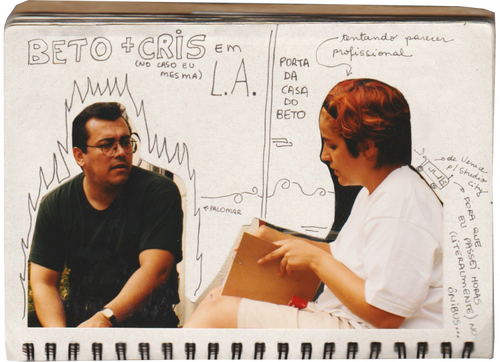
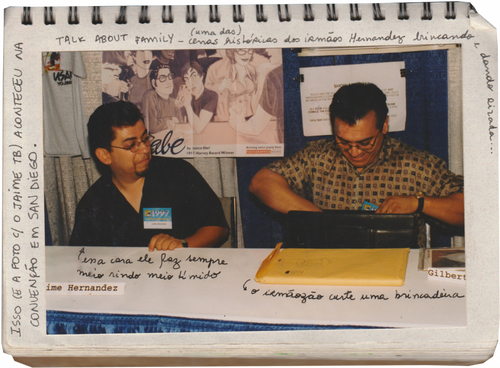
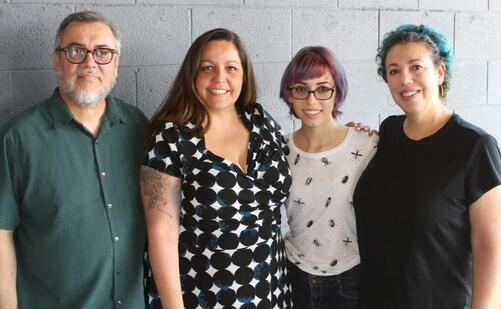
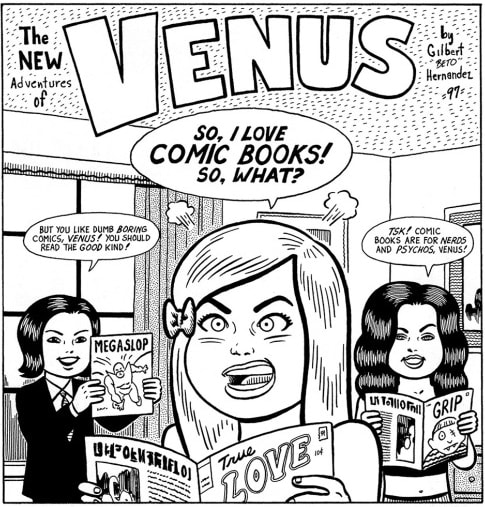
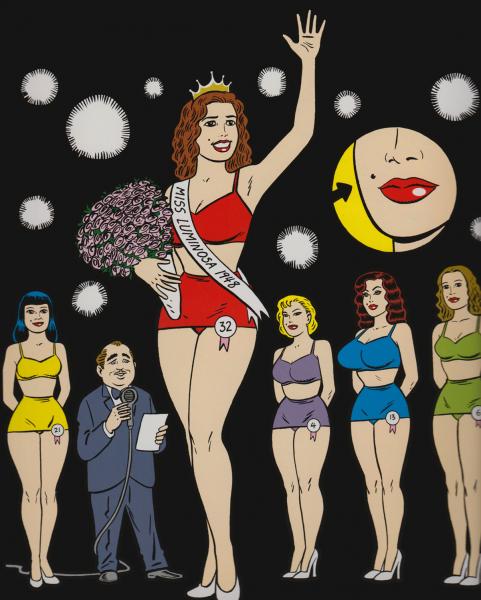
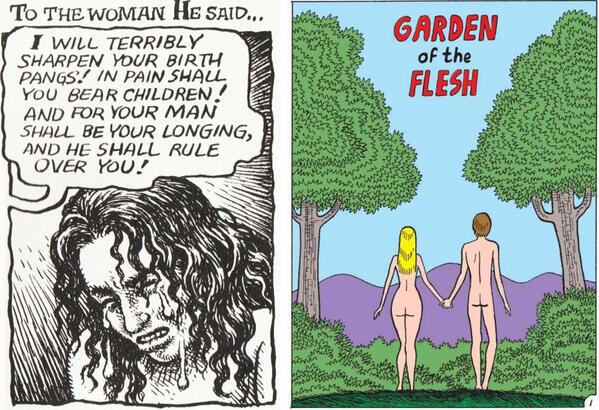
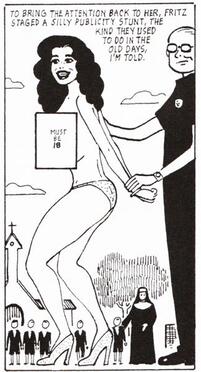
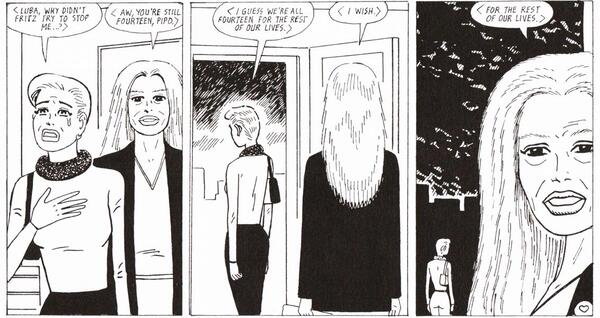
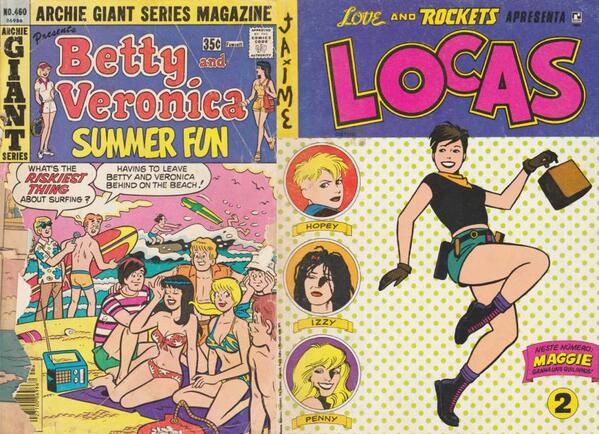
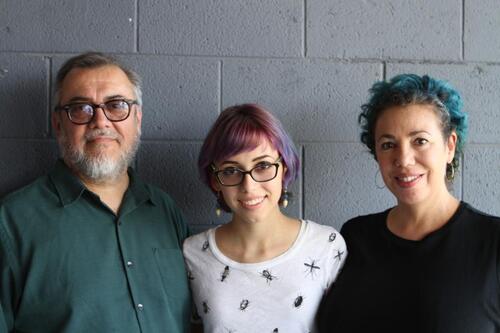
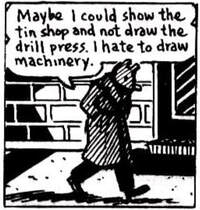
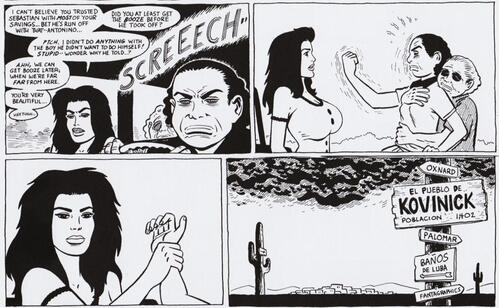
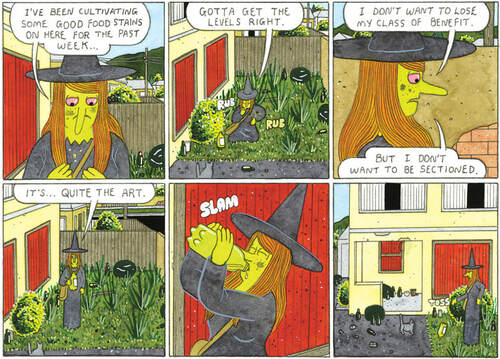
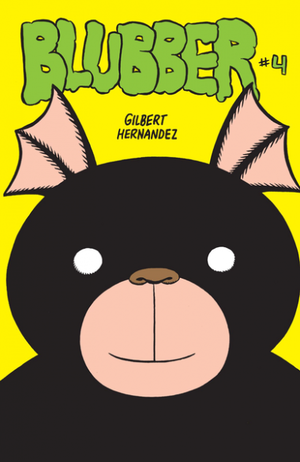
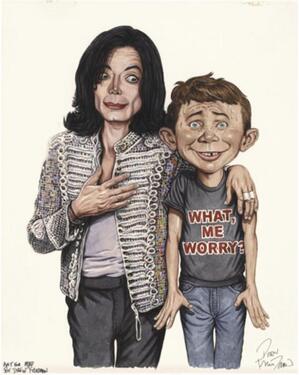
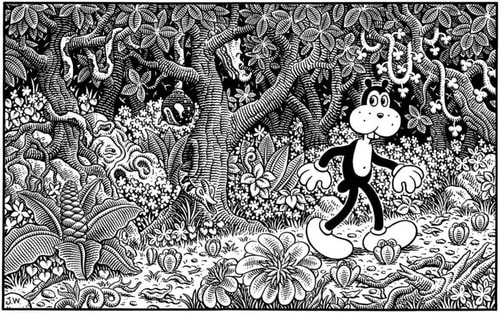
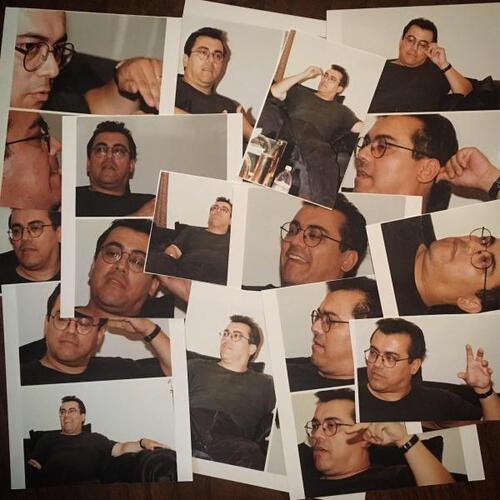
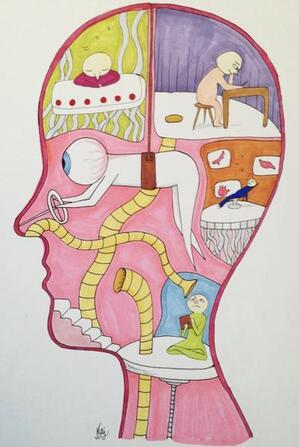
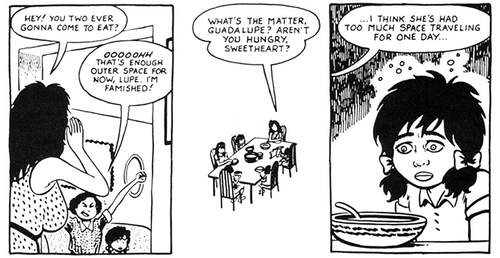
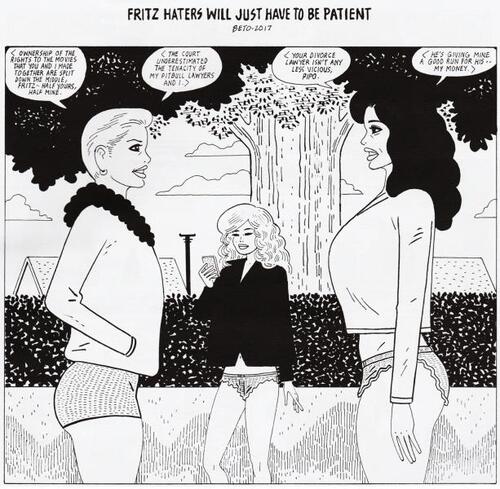
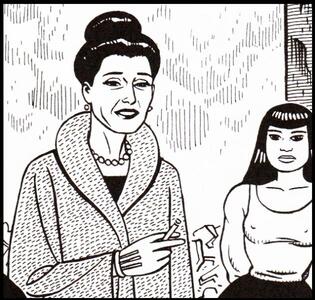

 RSS Feed
RSS Feed
